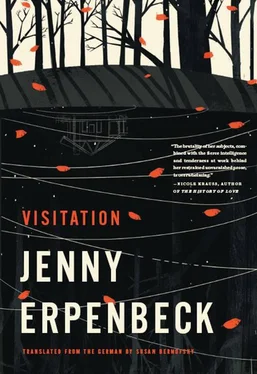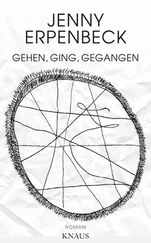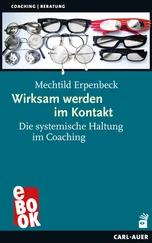ON THE WEEKENDS in winter when they come out to ice-skate, the subtenants see the footsteps of the gardener in the snow, they start at the guest room and lead sometimes here, sometimes there, crisscrossing the two upper meadows and also passing through the front garden and out the gate, but the prints make clear that none of these paths has been followed more than once. When they run into the gardener, which seldom happens, they ask if he needs something they can bring him next time they come — fresh bread from the baker in the village, eggs, noodles, fruit or something to drink. But the gardener always declines, he shakes his head and goes on his way, a cold cigar stump in his mouth. In the village they say that after the fall of the Berlin Wall the subtenants sold the genuine Meissen porcelain for cheap to buyers from the West. In the village, they say that the gardener has, for some time now, eaten nothing but snow.
When the mistress of the house arrives from Berlin to clear everything out for the investor, the gardener is not there. In his room, the table, chair and bed are as always, a few pieces of clothing have been tossed over hooks, and his rubber boots still stand in one corner, but the gardener himself is not there. The subtenants don’t know what to say when asked his whereabouts, they haven’t run into him for some time either; recently he’s been having more and more trouble walking, particularly downhill. Could something have happened to him? No, the subtenants respond, they don’t think so. Together with the mistress of the house and her friend from the village, they search the property from top to bottom looking for him, finally even checking along the shoreline as well. In any case, it’s obvious he is nowhere in the house.
The gardener is never seen again, and so two months later the mistress of the house and her father finally consent when the investor urges them once more to build a wall separating the gardener’s damp room from the main house to at last put a stop to the dry rot that has established itself there and begun to spread.
CLAIM: SURRENDER AND CLEARANCE of the land and house in exchange for compensatory payment to be rendered. Counter-claim. Whether acquisition was in good faith and in rem right of use and enjoyment exists is not relevant to the matter under dispute. Civil code of the Federal Republic of Germany, paragraph 985, plaintiff ’s basis for claim. Undisputed. Actual possession. Actual possession means: Something is under a person’s control. Civil code, paragraph 17. As additionally the court may choose not to rule on whether you are entitled to payment as a result of third parties in full knowledge of the claim for restitution having undertaken utilizations of the property, and given the exclusion of a right of retention due to the nature of the creditor claim. Entitlement of counterclaimant on the basis of action under law of unjust enrichment may exist in the amount of the difference between the current market value of the real property and the value without the additional investments. The point of time at which these utilizations were undertaken. Conciliation proceedings. Reference to the registry of deeds will be required to determine with sufficient certainty. Registry of a first priority property lien. In the present settlement. Further: Upon fulfillment of the present settlement all claims with regard to the object of dispute are hereby. Further: All claims with regard to the object of dispute are hereby satisfied and further litigation is hereby. Is hereby excluded.
And now she wants to go into the house one more time. With the key still hanging on her keychain, the key with which all the doors in the house and also the woodshed can be opened and closed, this worn-out patent key, Zeiss Ikon brand, which she should have turned in officially two days ago now, with this key she wants to unlock, one last time, the door whose lock always sticks after the first half-turn of the key. The door’s glass panes make a faint clinking sound, brittle splinters of red and black paint fall to the ground from the iron tendrils protecting the glass. First she lifts the door a little the way she always does so that the key will continue to turn, then opens the door wide until it hits the wall of the house, pushes the stone in front of it that is still sitting there ready for use, and goes inside.
The painted door to the broom closet has been removed from its hinges, so the first thing she sees when she walks into the house is not, as before, the Garden of Eden in twelve square chapters but rather an old broom, a hand brush, a shovel and a few rags. The door to the living room is off its hinges as well, and so she doesn’t have to press down the brass handle to go in, and no metallic sigh is heard when she enters the room. Nine years before, everything made of wood on or adjacent to the two walls affected by dry rot had to be taken down or torn out, and so the long bench seat from along the wall is missing. Workers carried the matching table and the two doors out to the bathing house. The bathing house was too small for the table, so they set it on end, which is how it is still standing today, she glimpsed it through the crack in the shutters as she came in. The key to the bathing house is still hanging in its usual spot on the key board beside the key to the workshop, and the workshop key still has the golden spoon lure dangling from it as usual, and the key board is hanging, as usual, around the corner next to the heating stove, except that now the stove is gone, and the wall it stood against is rotting. The dry rot spread all the way upstairs while she was abroad for work, and her father spent an entire autumn, winter and spring negotiating with the gentleman whom he had offered the right to speculate on the house, which still officially belonged to them, in exchange for carrying out the urgently needed repairs. They weren’t allowed to sell it as long as the official decision regarding the restitution claim was still pending, but after all the East German bank accounts were cut in half, they no longer possessed the means to keep up the house themselves. Present exigency: The property that is the object of the proceedings. Pending determination of ownership. Registration number 654.
Her father had never much cared for nature, even in earlier years he’d only ever pronounced the word “nature” with a certain contempt, and he always said he hated mowing the lawn, was bored by flowers, and found swimming utterly uninteresting, only on rare occasions would he dive among the reeds to hunt pike with his harpoon. And so it hadn’t surprised her when, after the death of her father’s mother, he immediately added her as co-owner to the title of the house — deletions are marked by placing vertical lines above the first and beneath the last line to be deleted and connecting the two lines on the diagonal from upper left to lower right. It hadn’t even surprised her that he didn’t make even a single trip out to the property after the heirs to the wife of the architect, all of them living in the West, had filed to have the ownership of the land restored to them, nor did it surprise her that he didn’t participate in clearing out the house after he had finally reached an agreement with the speculator. Her childhood friend, who helped her clear it out, had been the one to notice the dry rot. One single time during all the many years when the house then stood empty, while she and her father were waiting for the official ruling, he said something to her that she had never before heard from him, namely that every time he found himself having to look at a landscape like this somewhere, a landscape full of hills and lakes, he felt much the same way he felt whenever he heard someone speaking Russian, the language of the country in which he was born. What exactly he meant by this was never explained. She knew only that by the time he got out of the children’s home his parents had sent him to because they believed in collective education, he was old enough to mow the lawn. Nature.
Читать дальше












